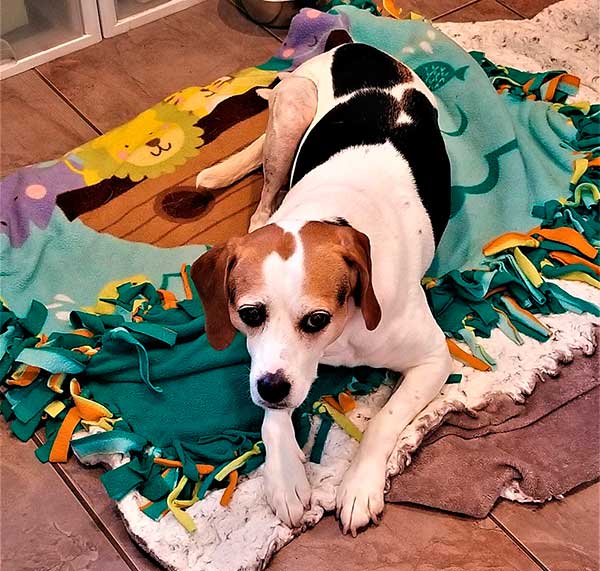Newsletter - March 2021
Spring fever gone wrong: Penny’s long road to recovery
Chalk it up to a case of the springtime zoomies.
That’s what Greenwood Lake Animal Hospital Veterinary Technician Melissa Romano is blaming her Beagle mix Penny’s ruptured cruciate ligament on.
“I let her out, and she was running where there was no snow in the back of the yard and then it looked like she tripped and she let out a bark,” Romano said. “And then, all of a sudden, she was on three legs.”
Diagnosed by Dr. Eric Louer and confirmed by Dr. Jonathan Miller at Oradell Animal Hospital in Paramus, Penny had torn her cranial cruciate ligament in her right knee and had surgery on March 17 to repair it.
“The first three days post-surgery I iced her knee and did warm compresses, and on day five she was allowed to go for 5-minute walks three times a day,” Romano said. “It’s a lot of work when this happens.”
Sent home on antibiotics and pain management medication, Penny must be leash walked everywhere and carried up and down steps, Romano said.
“They want you to get them moving, but it has to be controlled,” she said. “It has to be slowed down. If you don’t keep them moving, they get stiff and that’s bad, but if you let them go like a maniac, they have a chance of blowing the other knee.”
There’s also no furniture jumping allowed.
“Every seat cushion on the couch is up,” Romano said. “When we go downstairs, we have to make sure we close the door behind us or else she’s trying to follow us down there. It does change your lifestyle a bit until they get back to normal.”
Although she’s now using the leg 35-40 percent of the time, Romano said ‘normal’ doesn’t happen until somewhere around four months post op.
“There will be no zoomies any time soon,” she said.
Penny also has a condition called patellar luxation, Romano said, which didn’t help matters any.
With patellar luxation, the kneecap flips in and out of the patellar groove. If the condition is relatively mild, it may not need surgical correction, but it does stress the cranial cruciate ligament and can predispose it to rupture.
The ordeal has given Romano a whole new perspective on what clients face when given a cruciate rupture diagnosis.
“It’s definitely different and I definitely have a new view on what clients go through when they have to do all the physical therapy and keep them from going on furniture and slowing them down,” she said.

What’s the deal with pet insurance?
Unlike in human medicine, pet insurance currently works like a reimbursement program. Veterinary bills are paid up front, with pet owners submitting their invoices to their insurance company for reimbursement of qualifying expenses.
Trupanion, Petplan and ASPCA are some of the more well-known pet insurance companies, but, these days, home and auto insurance companies such as Nationwide, Allstate, Farmers, Geico and Progressive all offer some type of pet insurance. Coverage varies and depends on the company you choose to go with and the plan you decide best suits your needs.
When accidents happen, or illness strikes, having pet insurance can help make the cost of your pet’s care more affordable and reduce the financial anxiety that comes with a trip to the vet. Faced with that big bill, pet insurance might even be the difference between pursuing treatment or opting for “economic euthanasia,” where the owner simply cannot afford the cost.
Avoid the creepy crawlies
Ah spring! With its increased daylight and warmer temperatures, spring invites us to get outside after the long winter and get some fresh air.
Before Fluffy or Fido joins you on your next adventure, however, it’s important to remember their flea and tick prevention. If flea and tick prevention is something that fell by the wayside when the snow was flying, now’s the time to get back on track before any unwelcome guests move into your home (and onto your pet!).
While there are any number of products available on the market, GWLAH recommends Credelio, a chewable tablet for dogs taken monthly, and Seresto, a collar that works for eight continuous months, which is available for both cats and dogs.
In addition to the gross factor, fleas and ticks can cause infection and disease in pets, as well as diseases such as Lyme disease in their owners. As with other tick-borne diseases, Lyme disease can be debilitating for people and is better prevented than treated.
Remember: protecting pets protects their people!
Pet proof your home
March is Poison Prevention Awareness Month, and, as you go about your spring cleaning, please remember to keep cleaning products out of reach and away from your curious furry family members. That goes for toxic plants, foods and human medications as well.
What if, despite your best efforts, your pet did get into something? Did you know you can find out what to do next by calling The American Society for the Prevention of Cruelty to Animals (ASPCA) poison control hotline?
The ASPCA Animal Poison Control Center (APCC) is a great resource for any animal poison-related emergency, 24 hours a day, 365 days a year. If you think your pet may have ingested a potentially poisonous substance, call (888) 426-4435. According to the ASPCA’s web site, a consultation fee may apply.
Available for download from the App Store and Google Play, the APCC free mobile app helps owners quickly identify over 300 potential everyday hazards, provides crucial information about the severity of the problem and critical next steps.